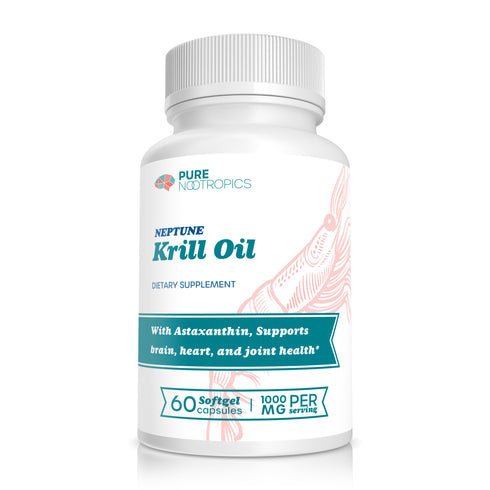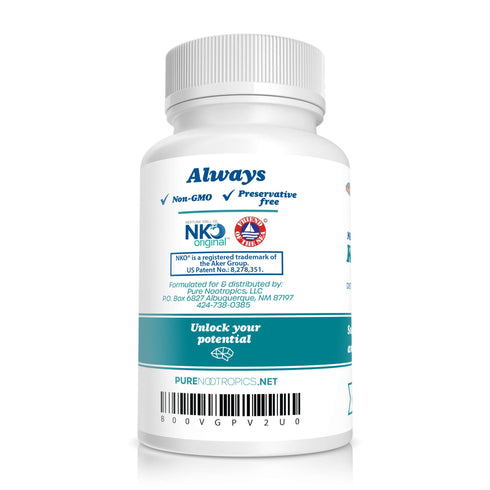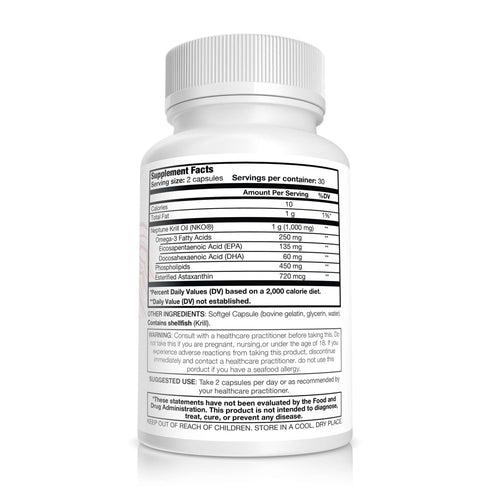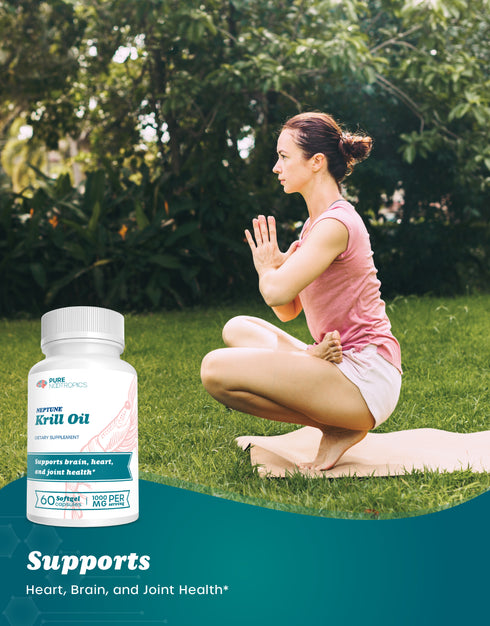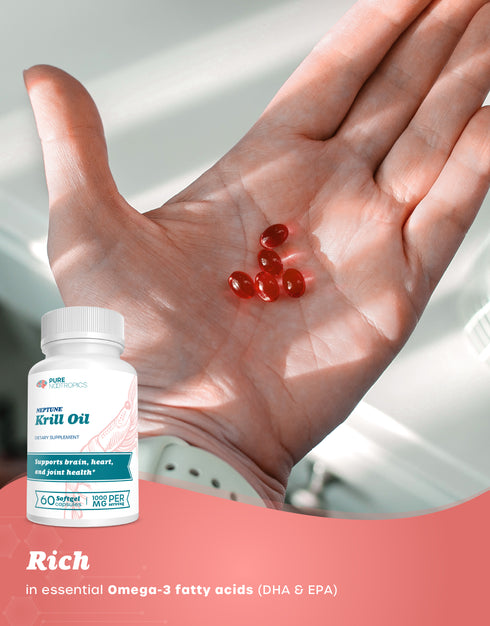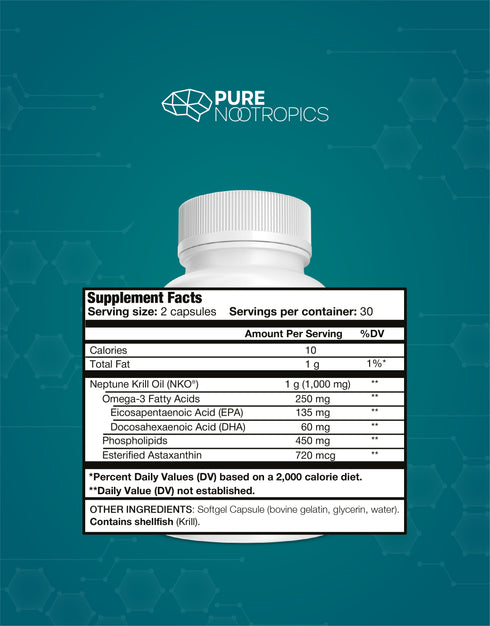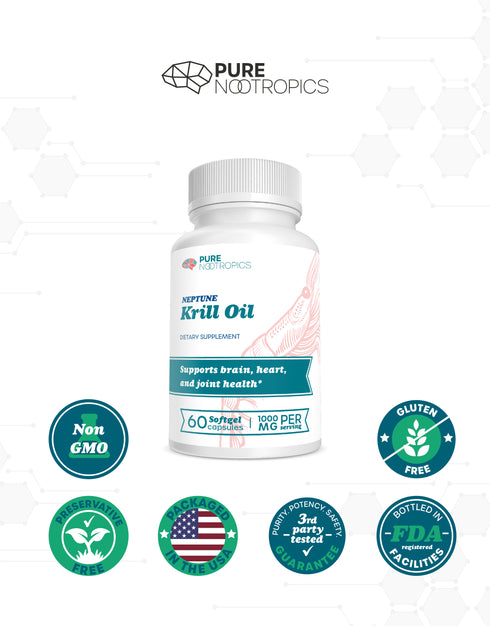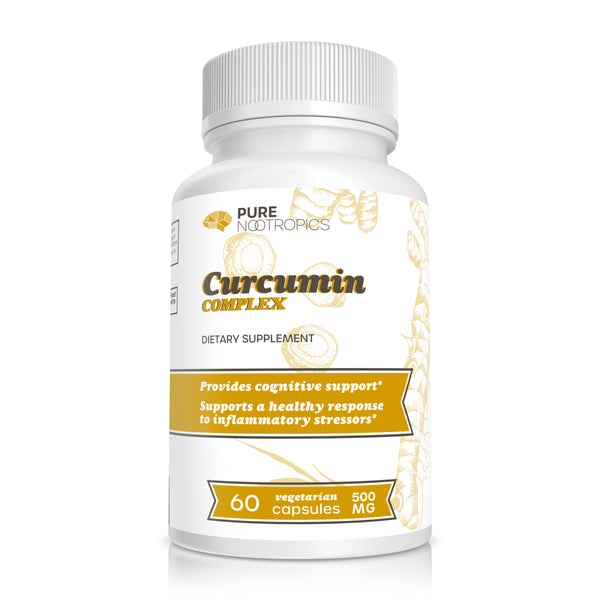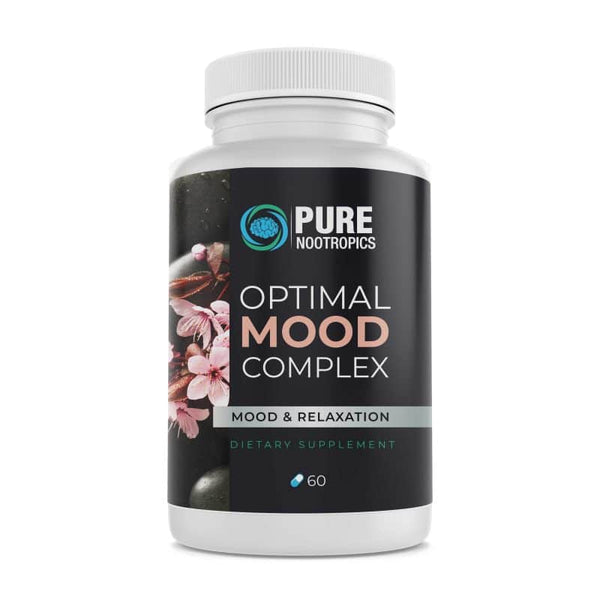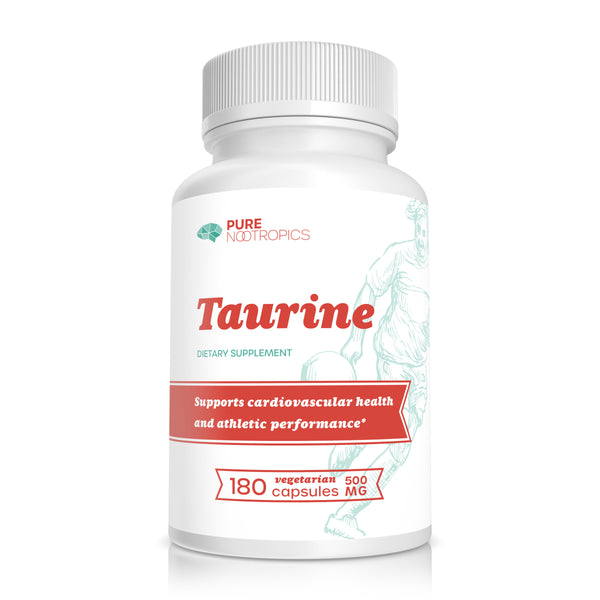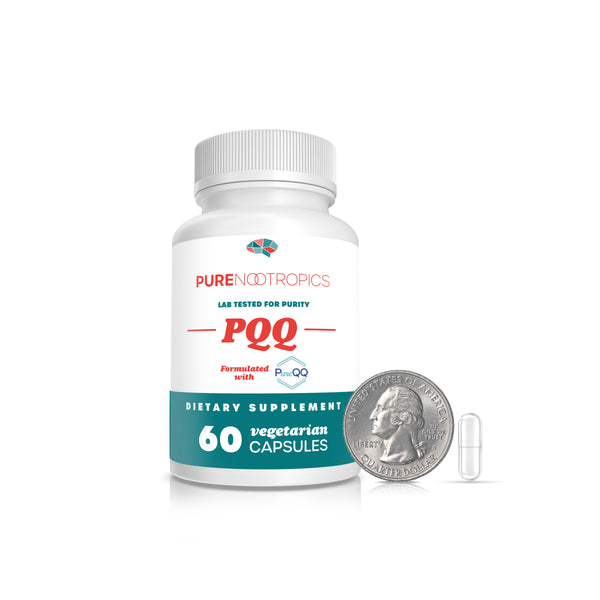Pure Nootropics’ Neptune Krill Oil (NKO®) Softgels provide Omega 3’s (DHA + EPA) plus Astaxanthin, a unique free radical neutralizer specific to Krill Oil.
Krill Oil Benefits
- Contains Astaxanthin for superior heart health support (ref)*
- Promotes a healthy response to inflammatory stressors (ref)*
- Supports Heart health (ref)*
- Supports Cognitive health (ref)*
- Supports Bone and Joint health (ref)*
- Supports Mood (ref)*
Krill Oil Description
Krill Oil is packed full of Omega 3 fatty acids - which have a host of health benefits across the body.
Every single cell in your body has a cell membrane which regulates nutrients coming in and out of the cell in order to keep its processes running efficiently. This is true of cells in your blood as well as the ones in your brain.
Consuming an adequate amount of Omega 3s ensures your cells are healthy and performing at their best.
However, as with most super nutrients, the majority of people simply aren't getting enough - with Omega 3s being high on the list as most of us simply don't consume enough seafood.
Pure Nootropics' Krill Oil is a highly effective way to increase the amount of Omega 3s in your diet - at a fraction of the price of fresh seafood.
Pure Nootropics' Krill Oil is more effective with the inclusion of Astaxanthin - a highly potent ingredient that helps protect your body from the damage of free radicals in the environment.
Krill Oil Dosage
Pure Nootropics’ Neptune Krill Oil (NKO®) Softgels provide 1000 mg of Krill Oil and 400 mcg of Astaxanthin per (2) softgels. Suggested use for adults is 2 capsules by mouth once daily, or as directed by your healthcare practitioner.
The references below are not meant to imply that any of our products treat, cure, or diagnose any disease or human condition. References to clinical studies and pre-clinical studies may use varying dosages and may not represent the dosages or subsequent results of products we sell; however, the references provided are pertinent to the subject supplement itself. References provided are intended for research and informational purposes only and do not represent the entire body of knowledge available on the subject(s) referenced; nor do they represent all possible outcomes associated with the subject(s) referenced including, but not limited to, adverse effects, precautions, or chemical interactions within the human body. The Content provided on this website is not intended to be a replacement for professional medical advice, treatment or diagnosis. Never ignore the advice of a medical professional or delay in attaining professional advice because of information or impressions you gather on this website. Choosing to rely on any information provided by the Content of this website is solely at your own risk. We encourage our audience to do their own research beyond the resources we have provided so your decision is as educated as possible.
• Contains Astaxanthin for superior heart health support*
Ulven, Stine M et al. “Metabolic effects of krill oil are essentially similar to those of fish oil but at a lower dose of EPA and DHA, in healthy volunteers.” Lipids vol. 46,1 (2010): 37-46. doi:10.1007/s11745-010-3490-4.
• Promotes a healthy response to inflammatory stressors*
Deutsch, L. “Evaluation of the Effect of Neptune Krill Oil on Chronic Inflammation and Arthritic Symptoms.” J Am Coll Nutr., vol. 26, no. 1, Feb. 2007, pp. 39–48., www.ncbi.nlm.nih.gov/pubmed/17353582.
• Supports Heart health*
Peter, Soumia et al. “A fish a day, keeps the cardiologist away! – A review of the effect of omega-3 fatty acids in the cardiovascular system.” Indian journal of endocrinology and metabolism vol. 17,3 (2013): 422-9. doi:10.4103/2230-8210.111630.
• Supports Cognitive health*
Ghasemi, S Fard, et al. “How Does High DHA Fish Oil Affect Health? A Systematic Review of Evidence.” Crit Rev Food Sci Nutr., 1 Mar. 2018, pp. 1–44., doi:10.1080/10408398.2018.1425978.
• Supports Bone and Joint health*
Kruger, MC, and DF Horrobin. “Calcium Metabolism, Osteoporosis and Essential Fatty Acids: a Review.” Prog Lipid Res., vol. 36, no. 2-3, Sept. 1997, www.ncbi.nlm.nih.gov/pubmed/9624425.
• Supports Mood*
Fontani, G, et al. “Cognitive and Physiological Effects of Omega-3 Polyunsaturated Fatty Acid Supplementation in Healthy Subjects.” Eur J Clin Invest., vol. 35, no. 11, Nov. 2005, pp. 691–9., www.ncbi.nlm.nih.gov/pubmed/16269019.
1. Fassett, Robert G, and Jeff S Coombes. “Astaxanthin: a potential therapeutic agent in cardiovascular disease.” Marine drugs vol. 9,3 447-65. 21 Mar. 2011, doi:10.3390/md9030447.
2. Ulven, Stine M et al. “Metabolic effects of krill oil are essentially similar to those of fish oil but at lower dose of EPA and DHA, in healthy volunteers.” Lipids vol. 46,1 (2010): 37-46. doi:10.1007/s11745-010-3490-4.
3. Bradbury, Joanne. “Docosahexaenoic acid (DHA): an ancient nutrient for the modern human brain.” Nutrients vol. 3,5 (2011): 529-54. doi:10.3390/nu3050529.
4. Peter, Soumia et al. “A fish a day, keeps the cardiologist away! – A review of the effect of omega-3 fatty acids in the cardiovascular system.” Indian journal of endocrinology and metabolism vol. 17,3 (2013): 422-9. doi:10.4103/2230-8210.111630.
5. Ghasemi, S Fard, et al. “How Does High DHA Fish Oil Affect Health? A Systematic Review of Evidence.” Crit Rev Food Sci Nutr., 1 Mar. 2018, pp. 1–44., doi:10.1080/10408398.2018.1425978.
6. Kruger, MC, and DF Horrobin. “Calcium Metabolism, Osteoporosis and Essential Fatty Acids: a Review.” Prog Lipid Res., vol. 36, no. 2-3, Sept. 1997, www.ncbi.nlm.nih.gov/pubmed/9624425.
7. Wani, Ab Latif, et al. “Omega-3 Fatty Acids….: a Review of Scientific Evidence.” Integrative Medicine Research, vol. 4, no. 3, Sept. 2015, pp. 132–141., doi:https://doi.org/10.1016/j.imr.2015.07.003.
8. Fontani, G, et al. “Cognitive and Physiological Effects of Omega-3 Polyunsaturated Fatty Acid Supplementation in Healthy Subjects.” Eur J Clin Invest., vol. 35, no. 11, Nov. 2005, pp. 691–9., www.ncbi.nlm.nih.gov/pubmed/16269019.
9. Goel, Akshay et al. “Fish, Fish Oils and Cardioprotection: Promise or Fish Tale?.” International journal of molecular sciences vol. 19,12 3703. 22 Nov. 2018, doi:10.3390/ijms19123703.


